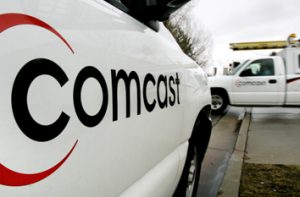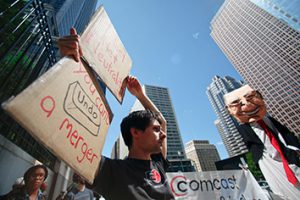
Comcast to spin off cable networks that once starred for entertainment giant
Like other cable companies, Comcast in recent years has shifted its business emphasis away from traditional cable toward streaming and other sources of revenue.

Like other cable companies, Comcast in recent years has shifted its business emphasis away from traditional cable toward streaming and other sources of revenue.
The move by cable and satellite providers is meant at least in part to cover increasing costs for carrying networks and popular channels, but they risk exacerbating the trend of canceling service altogether.
Comcast isn't likely the only mega-media bid in the works. There will probably be a rush to consolidate. Here's a look at some of the proposed combinations that could transform the media landscape and change how people get their entertainment.
The nation’s biggest cable provider lost video subscribers for the third straight quarter, but 350,000 customers signed up for broadband service, helping the company top sales and earnings estimates.
Barring a major fourth-quarter comeback, 2017 is on course to be the worst year for conventional pay-TV subscriber losses in history.

With the change, Comcast could attract new subscribers at a time when growth in the pay-TV business has slowed.
Federal regulators on Monday approved Charter’s $67 billion bid to buy Time Warner Cable and Bright House Networks, two companies that have about 240,000 customers in Indiana.
Comcast, the largest cable company in Indiana and the nation, is trumpeting its best year for traditional TV services in nearly a decade, even though it continues to lose TV subscribers.
Even though most residential customers can easily meet most of their Internet needs with speeds of about 100 megabits per second, Internet service providers are aggressively rolling out gigabit—1,000 mbps—offerings nationwide.
Charter Communications Inc.’s deal to buy Bright House for $10.4 billion is now in jeopardy because it had depended on Comcast Corp. closing its now-defunct merger with Time Warner Cable Inc.
GreatLand Connections would have been the fifth largest cable company in the United States, with more than 2.5 million subscribers, including 344,400 in the Indianapolis area.

Comcast Corp. has dropped its $45.2 billion deal to buy Time Warner Cable Inc., officially pulling the plug after concluding the merger would be rejected by regulators. The merger would have completely changed the cable industry landscape in central Indiana.
Comcast is prepared to call off the deal if concessions needed to win federal approval are too strict, according to people familiar with the matter. The merger, if completed as planned, would shake up the cable industry in central Indiana.

Comcast, the nation’s largest cable company, is looking to expand with its proposed $45 billion acquisition of Time Warner Cable. But customers in central Indiana won’t come along for the ride. To ease antitrust concerns, Comcast plans to hand 2.5 million customers to a new spinoff called GreatLand Connections.

Technology has paved the way for people to engage with more aspects of their homes beyond security features. As a result, cable, phone and other companies have taken notice and jumped into the space.

GreatLand Connections Inc. is geared to replace Comcast Cable in Indianapolis and some other markets in 2015, and the switch could bring changes in offerings, rates and service.
The deal would combine the nation’s top two cable TV companies and create a dominant force in both creating and delivering entertainment to U.S. homes.
A decision by Comcast Corp. to ban commercials touting firearms and ammunition has left some Indiana gun store owners searching for new ways to advertise their products.
It began offering the service last year in Houston.
Cable TV giant Comcast Corp. has notified the state of Indiana that it plans to eliminate 57 customer-retention employees in its Fishers office by the end of the year, but also plans to add 37 customer-service workers during the same time period.